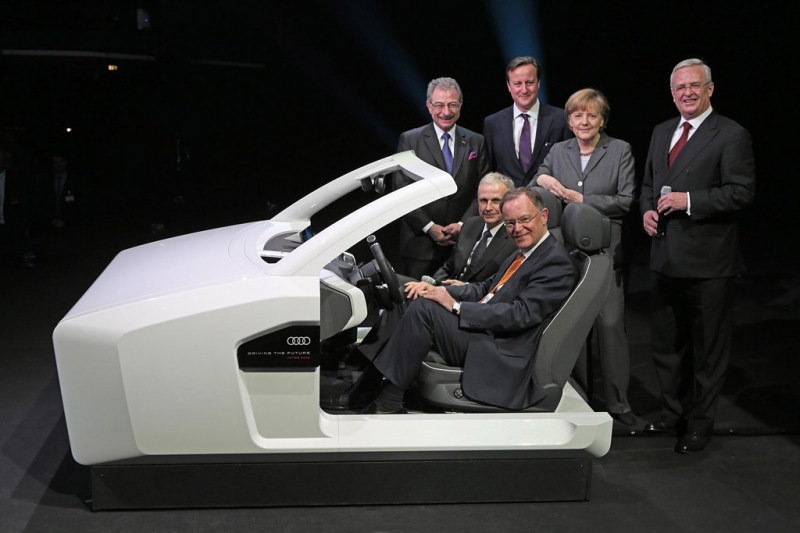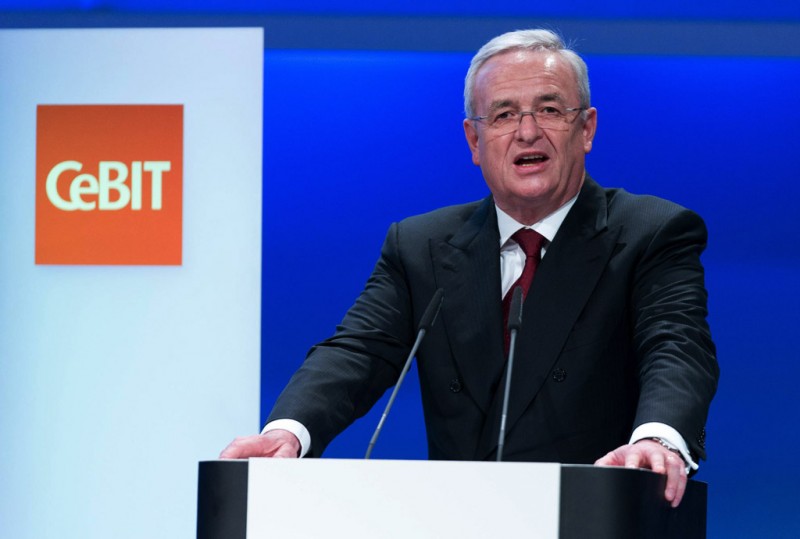The automobile is approaching a new era of digitalisation which will have fundamental impact on the mobility of the future. The Chairman of the Board of Management of Volkswagen Aktiengesellschaft, Prof. Dr. Martin Winterkorn, said at the opening ceremony of CeBIT 2014 in Hanover:
“The two ground-breaking inventions, the automobile and the computer, are moving closer together. We need to shape the mobility of the future in an even more intelligent, more networked way.”
In an address to 2,500 guests in the Kuppelsaal of Hanover Congress Centre in the presence of Federal Chancellor Dr. Angela Merkel, the British Prime Minister David Cameron, the Minister-President of Lower Saxony Stephan Weil and Prof. Dieter Kempf, President of BITKOM, the IT industry Association, Winterkorn declared that the increasingly intensive networking of cars with their surroundings and automatic driving would be the key topics for the intelligent mobility of the future. Winterkorn emphasised:
“Information technology has been a key component of the automobile industry for some time. Our cars are already mobile computer centres, with 1.5 km of cables, more than 50 control units and the computing power of 20 highly advanced PCs. Now we face the considerable challenge of making mobility even more intelligent and more networked together with the IT industry.”
He said that there could certainly be learning effects in this context:
“With digital innovations, the IT industry is transforming the way we live and work. It is rolling its technologies and products out to the customer in shorter and shorter cycles. These are topics that also call for intensive efforts in the automobile industry. People’s expectations of mobility are changing fundamentally. And our customers’ wishes for their own cars are changing faster and faster. This is why the Volkswagen Group has recently launched a major new future-oriented initiative ‘Future Tracks’. This initiative will bring the brightest people in our Group together in order to find answers to the major challenges faced by our industry. Digitalisation will play a key role in this process.”
He said that the Volkswagen Group already employed 9300 highly qualified IT specialists and was investing about €3.8 billion per year in information technology.
According to Winterkorn, no one can realise the intelligent car of the future working alone:
“The challenges we face here are the modernisation of infrastructure, the clarification of legal aspects and the strengthening of Germany as an IT location. The automobile industry, the IT industry, business, scientists and politicians therefore need to join forces. The mobility of the future will be worthwhile for everyone concerned – especially for consumers, who will benefit from cars that are even safer, more comfortable and more intelligent.”
Winterkorn did not avoid critical topics:
“The car must not become a data monster. We already protect our customers against a wide variety of risks such as aquaplaning, micro-sleep and long, time-consuming congestion. With the same attention to our responsibilities, we intend to protect our customers against the abuse of their data. I clearly say yes to Big Data, yes to greater security and convenience, but no to paternalism and Big Brother. At this point, the entire industry is called upon. We need a voluntary commitment by the automobile industry. The Volkswagen Group is ready to play its part.”
Volkswagen has been consistently moving ahead with automatic driving technology for 15 years. At CeBIT, Winterkorn presented the vision ‘James 2025’, a world premiere, to the Chancellor and the British Prime Minister. This study developed by Volkswagen Group Research demonstrates how the virtual cockpit of the future could look. As soon as the automatic driving mode is activated, the steering wheel, seating position and light coding change, and a large central screen gives all the vehicle occupants details of any planned driving manoeuvres. A second screen with touchpad operation on the console of the central tunnel provides additional infotainment functions.
At CeBIT, Volkswagen Group IT is presenting the key topics Connected Car and Electro-Mobility in Hall 2. Exhibits from five Group brands give an idea of the world of car IT and electrified powertrains. Apart from demonstration vehicles, the exhibits include apps, a gesture-controlled cockpit and telematics applications. Presentations in the ‘job&career’ series and a multimedia wall with job advertisements in Hall 9 give an idea of practical work and inform young graduates and IT experts about the largest IT organisation in the automobile industry. 15 e-up!1 vehicles are used as shuttles in the exhibition area.
Source; Volkswagen


